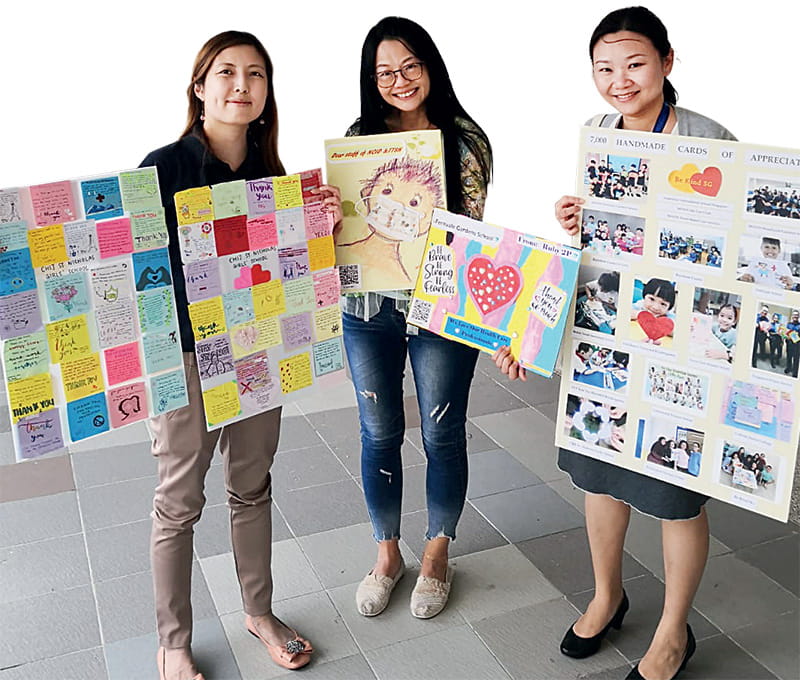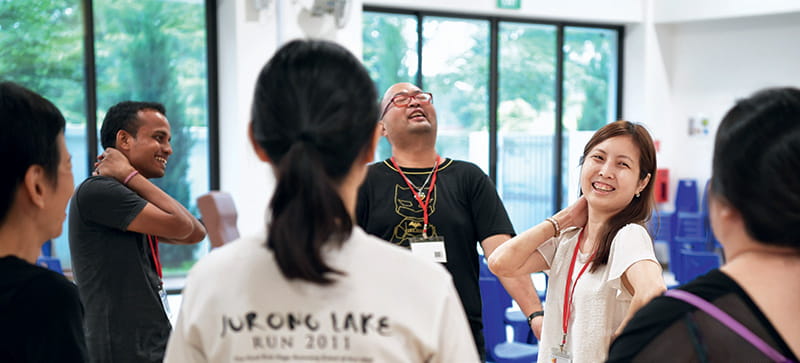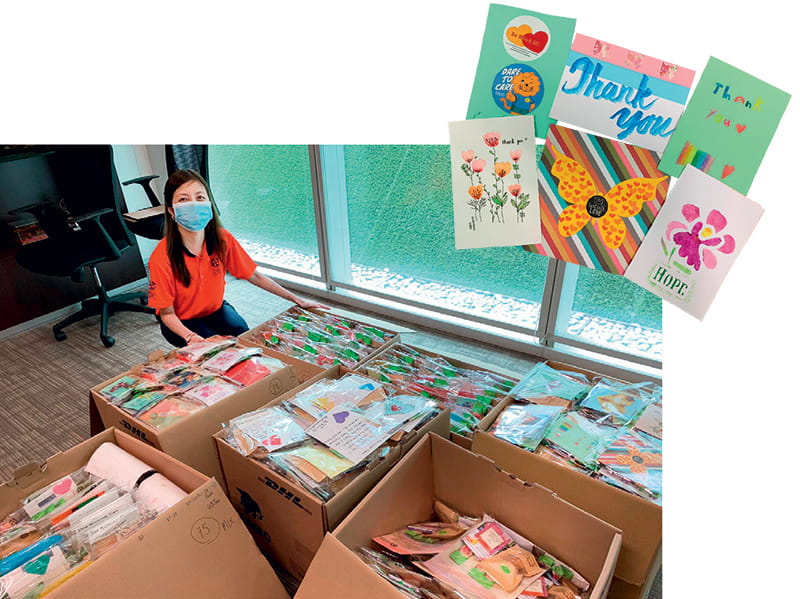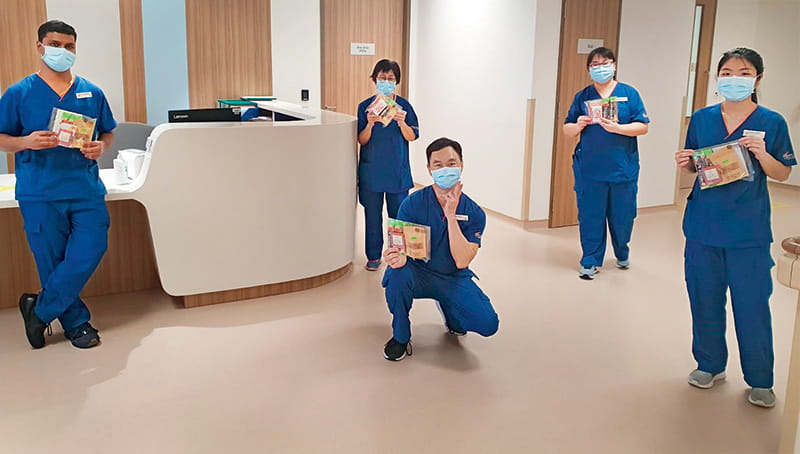Stories > Bringing The Invisible To Light
Bringing The Invisible To Light
SIF Arts for Good Fellowship alumnus Sherry Soon shares why she lives her life in service of those less fortunate than her.
BY ALYWIN CHEW
hile some people spend their entire lives trying to figure out the answer to the meaning of life, to Sherry Soon, this answer has always been obvious. “To me, it’s very simple. Life is about how we can make the most positive impact in the lives of others,” says Soon, the founder of Be Kind SG.
Over the past 17 years, the 39-year-old has regularly participated in volunteer activities. One of her first stints was at Rainbow Centre, a charity organisation that provides support and training opportunities for people with disabilities, where she helped with classes catering to special needs children. The motivation behind this stint, she says, was that she felt an affinity toward these children as they both suffered from “invisible” diseases.

Sherry Soon (left) continues to collaborate with her peers from the SIF’s Arts for Good Fellowship programme through various arts initiatives.
Diagnosed with the autoimmune disease vasculitis when she was 20, Soon has spent the past 19 years stuffing herself with a dizzying array of drugs, some of which prevent her condition from flaring up, some of which are for dealing with the serious side effects that the former group of drugs induces. She will spend the rest of her life on medication.
“Having vasculitis is not the same as special needs, but they are both conditions that are ‘invisible’ to everyone,” she explains. “The frustration is unique to every person. Sometimes I think my friends forget I have this condition when they ask me out. There’s a limit to the type of social activities that I can do. For example, I can’t go for walks in a park due to the ulcers on my leg.”

One of the causes close to Soon’s heart is working with young people with learning difficulties.
She applied what she learnt from this volunteering stint to her first job as an educational therapist at the Dyslexia Association of Singapore and, subsequently, a teacher at Shine Children and Youth Services where she taught children with learning difficulties. She also carved out time to engage with other “invisible” groups by volunteering at a Photovoice Singapore project that through photographs shone a light on the struggles that HIV patients face in their lives.
Later, Soon herself became part of the initiative, documenting her struggles with autoimmune disease by taking photos of herself that revealed the scars on her legs, a by-product of vasculitis. To convey the pain that she feels during flare-ups, she stuck pins onto the images.
DOING GOOD, FULLTIME
Five years into her second job, Soon decided to leave, partly because of her condition, and partly because she was eager to explore other avenues besides teaching. Having volunteered regularly throughout the years, she toyed with the idea of setting up a volunteer movement. Following her husband’s suggestion that she should “try doing that on a bigger platform”, she established micro-volunteering organisation Be Kind SG in May 2017.
“I wanted to promote volunteerism by reducing the barriers. As a microvolunteering organisation, we don’t expect volunteers to make a long-term commitment. There is also less paperwork for them to fill up before they can volunteer,” she says.
“The Impact That The A4g Fellows Have Created Through Their Work Has Inspired Me To Achieve Similar Results.”
“For example, it’s not easy to volunteer at a welfare home. There’s usually a tedious administrative process and this can be a turn-off for some people. Also, sometimes people just don’t know where to find volunteering opportunities. Be Kind SG can be a platform for them to do so.”
Indeed, Be Kind SG’s approach is refreshingly straightforward and hassle-free. The organisation does not even have an official website. The call for volunteers has always been done via Meetup.com.

Recently, Soon organised an initiative to design appreciation cards for frontline healthcare workers for a project supported by the SIF.
Given her prior volunteering experience, finding participants for her meaningful activities wasn’t a problem. Finding funding, on the other hand, was. “To do more activities means having to find funding. I think this is a challenge that most groups face. Besides making calls and sending on Facebook and my volunteers helped to spread the word,” she says.

Slowly but surely, sponsors started coming onboard. Today, Be Kind SG is backed by entities such as the Central Singapore Community Development Council, the Singapore Kindness Movement and the National Volunteer and Philanthropy Centre. Soon, however, does not take a single cent for her efforts.
“Health Workers Have Been Soldiering On To Support Our Society During This Covid-19 Crisis, Despite The Immense Stress They Are Under. We Hope That These Cards Will Provide Some Mental Relief And Show Them That We Are Behind Them”
Sherry Soon, Founder, Be Kind SG
That same year, despite having a plate full of commitments, Soon still found a way to hone her ability to help others by becoming a part of the Singapore International Foundation’s Arts for Good (A4G) Fellowship. The annual fellowship brings together artists, art administrators, and social sector professionals in a community of practice that harnesses the power of arts and culture to create positive social change.
The experience was eye-opening, recalls Soon, who learnt from the various participants about how they leveraged art to make a difference to the lives of the disadvantaged in society. “I never knew about the concept of playback theatre until I met Michael Cheng, a drama practitioner. I also got to visit another fellow, Loh Sau Kuen, at her workplace at Touch Community Services, which has developed a structure to use art to help special needs people.”
EMPOWERING OTHERS THROUGH ART
Many of the activities organised by Be Kind SG reflect her learnings from the fellowship as they involve taking volunteers to welfare homes and hosting art sessions for the special needs individuals who reside there.
“It’s a two-way exchange. The volunteers get to understand special needs individuals better and realise that they are no different from everyone else. On the other hand, the special needs individuals get to grow in confidence and self-esteem through these art sessions,” says Soon.
“The Beauty Of Life Is In Understanding The Different Communities Around Us. After All, Our Life Is Richer Not Because Of What We Have But Because Of The People We Meet.”
When asked why art is an effective means to helping special needs individuals feel included and understood, Soon says this is because there is no right or wrong in art. “In art, the sky doesn’t have to be blue; it can be yellow or purple. Art is all about self-expression which gives you the confidence,” she explains.
Helping such individuals is important, says Soon, as they can often be misunderstood. “It’s not easy to identify people with intellectual disabilities. If you don’t have experience in this field, you might misconstrue their behaviour and that’s when problems start to occur,” she says.

Soon (far right) and her cohort of A4G 2017 fellows participated in an experiential learning session at Very Special Arts Singapore facilitated by artists with disabilities.
This year, the organisation also kickstarted an initiative to create greeting cards to show their appreciation to medical workers at Tan Tock Seng Hospital and Outram Community Hospital who were engaged in the fight against the Covid-19 pandemic. The project is supported by the SIF’s Citizen Ambassador (CA) Development Fund, which enables its CA community to share their volunteering experiences and champion the positive impact of the organisation’s community development projects through different initiatives.
“We wanted to call attention to the work of the staff at the community hospitals during this Covid-19 situation. Patients typically have a longer stay at community hospitals, where many of them receive rehabilitative services to maximise their physical abilities before returning home and to their communities. During this crisis, extra care and precaution must be taken by health workers to lower transmission risks for the patients,” she explains.
“I was also able to harness the artistic skills of the A4G fellows to create appreciation cards for the hospital staff that have been quietly soldiering on to support our society, despite the immense stress they are under. We hope that these cards will provide some mental relief and show them that we are behind them.”
Among those who helped create these cards were alumni of the A4G Fellowship, such as Singaporeans Karen Koh, Gillian Ong, Loh Sau Kuen, Tan Jia Yee and Amanda Chen.
CREATING A BETTER UNDERSTANDING
Overseas fellows she has met through the programme, such as Parasuram Ramamoorthi and Sriram Ayer have also been a positive influence. “The impact that they have created through their work has inspired me to achieve similar results,” she says. As a CA, Soon has managed to bring Singaporeans and the international community together.
Following the conclusion of the A4G study trip in Malaysia in 2018, Soon organised a volunteer outing for her fellows in the country, taking them to a school for refugees where they made greeting cards for the students, many of whom are from Somalia.
Be Kind SG’s modus operandi is unlikely to change in the future, says Soon. By her own admission, she wants to focus on groups that aren’t well-understood, particularly in fast-paced urban societies in which people hardly have the time to understand others and are often quick to judge. “But the beauty of life is in understanding the different communities around us. After all, our life is richer not because of what we have but because of the people we meet,” she concludes.
|
The work of the Singapore International Foundation (SIF) is not possible without the support of many Singaporeans who generously give of their time and talent. Their collective efforts bring us closer to becoming a nation of responsible global citizens. Singaporeans play the role of Citizen Ambassadors (CA) when they volunteer to work alongside their overseas counterparts to shape new realities, while fostering greater intercultural understanding. citizens. A CA is a friend of the world—someone who recognises that Singapore sits within the global community and that there is a need for greater understanding between countries in order to build a better, more peaceful and inclusive world. citizens. As key enablers of our work, all our CAs abide by the SIF Global Citizens Charter, which sets out the principles, values and behaviours expected of them, based on the SIF’s mission and core values.
|

 Scan here to find out more
Scan here to find out more